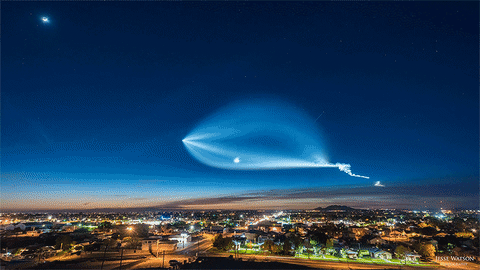Get used to this shit:
On Dec 22, 2017, SpaceX succesfully launched 10 Iridium Next Communications Satellites into orbit from Vandenberg Air Force Base around dusk. The launch resulted in the visual to the right, causing fender benders, dropped macchiatos, and die hard conspiracy theorist to jump the gun on the "I told you so" calls they are now,
once again, waiting to make.
And who can blame them...the iridescent wake of the rocket tearing through a twilight lit ozone made even the most astitute aerospace engineers say "The fuck is that?...." for atleast a second. SpaceX and Elon Musk seem to have a taste for showmanship(why else launch it at dusk?) and we'll probably see more of this in the near future as SpaceX has now been given permission by the FCC to start launching satellites for its planned 12,000 satellite constellation array for its wireless, global, internet service Starlink.
All 12,000 satellites are planned to be in orbit by 2020, and with SpaceX's succesful testing of Falcon Heavy, the
world's most powerful rocket, they now have the work horse as well the permission to start blasting shit into space. Unlike previous versions of this idea that feature HEO(High Earth Orbit) Satellites that are high in latency due to distance and few in number due to cost, SpaceX's array will consist of a plethora of LEO(Low Earth Orbit) Satellites that will operate like a relay system so if one or even a dozen satellites somehow fall out of the sky at the same time, there is minimal effect on the system as a whole. SpaceX also promises that the performance of these satellites will be on par with the fiber optic internet but the main objective of the system is to provide rural areas with connectivity that wouldn't have it otherwise and to give more options to the urban areas that do have connectivity.
This changes everything
Essentially, this initiative and others like it(there is another planned global internet constellation called
OneWeb) will destroy(or atleast decrease) the ability of governments to censor the data that their people have access to. Basically, as far as information is concerned, this is the best thing that could happen and with the progression of technology, is inevitable.
But isn't odd that the FCC, which just recently tried to
end net nuetrality would approve a plan to decentralize and globalize the internet? It lacks sense and only gains it when we assume that this network
WONT be decentralized. But in the infant age of blockchain, this network would surely be decentralized! The only reason why the crypto market is worth hundreds of billions of dollars is people's understanding of the secure nature of blockchain and the effecient nature of decentralization. To build this system with a central point of failure would be like trying to run a Ferrari off Kerosene....or listening to Dubstep on Vinyl....or electing a Reality TV star as President(......damn).

So what does the FCC know that we don't? I honestly have no idea. I have to assume that the corporations that bribe them(Verizion, AT&T, Comcast, etc) have finally realized that controlling the internet, even as an internet provider, is completely impossible. Gone are the days of internet monopolies and cyber censorship. As we become more aware of our virtual presence and our worth as an online entity creating metadata with every click, we will start to take the web and our freedoms on it much more serious and as the ISPs know, information is power....the same information they've tried to censor from us again and again. Then again, Skynet and Starlink might as well be synonyms so we'll just have to wait and see.
Thoughts?



Hi, I found some acronyms/abbreviations in this post. This is how they expand:
People who liked this post also liked:
Some of my SKYDIVING FUN by @ogc